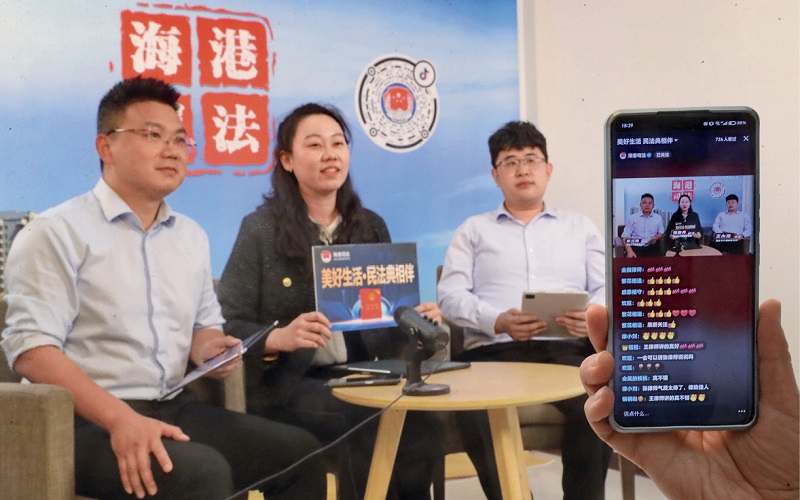As digital technology grows, it will improve accessibility to justice and legal protection for the differently abled and promote social justice.

Lawyers do a livestream program in Qinhuangdao, Hebei Province, to improve public awareness of the Civil Code on May 7, 2024.
The rapid development of digital technology is not only changing traditional working modes but also profoundly impacting the application of laws, evidence collection, trial process, and execution. Digital technologies can remedy many shortcomings in traditional judicial procedures, better protecting the legitimate rights and interests of people, especially people with disabilities.
During the 14th Five-Year Plan period (2021-2025), the digitalization of disability-related work has developed rapidly, and a big dataset for the disabled was established in China. In the future, efforts will be made to strengthen the management of basic data for the community by using a unified data collection platform. This will help provide a more targeted "one-case-at-a-time" service response to meet their individualized service needs.
To help the disabled cross the "digital divide," future development of information technology is expected to include the application of intelligent assistive technologies. For example, devices that can convert information on a computer screen into Braille and sound as well as other assistive technologies designed for people with different types of disabilities will be developed and improved.
Improved Accessibility and Convenience
Digitalization can improve legal protection for the disabled in a significant way, promoting the popularization and convenience of legal services. Through Internet platforms, they can obtain professional legal consulting services and legal knowledge at home without having to travel. Through the Internet, mobile apps and other channels, they can access information on laws and regulations, policy interpretations and legal aid anytime and anywhere, improving their legal awareness and ability to assert their rights.
They can also participate in judicial activities more conveniently. By using online live streaming, video conferencing and other means, they can participate in trials, mediation and other activities remotely. Digitalization can provide intelligent assistive service, such as voice recognition and text-to-speech transformation, to help them better express their opinions and needs, and improve the quality of judicial protection.
It can also help judicial organs such as courts and procuratorates improve their work efficiency. Through electronic case handling and online trials, the time to handle cases can be shortened and work efficiency improved. Judicial organs can better coordinate resources and rationally allocate manpower to improve work efficiency. Also, electronic records, video surveillance and other means can ensure the authenticity and completeness of evidence, and avoid human errors.
Since the public can better monitor judicial work, digitalization enhances judicial transparency. In summary, digitalization can improve the efficiency and quality of judicial protection, help safeguard the legitimate rights and interests of disabled people, and promote social justice.
Big data technology too plays an important role in better understanding the needs of people with disabilities. To understand their needs, data is collected from multiple sources such as government statistics, and medical, educational and social welfare institutions. The data includes basic information on the health status, educational level, employment status, and living conditions of people with disabilities, and its analysis can help divide the community into different groups based on their needs and characteristics, thus providing more targeted support and services for each group.
However, we should also be aware of the limitations of big data analysis, such as data quality and privacy protection issues. Therefore, when applying big data analysis, we need to fully consider these factors to ensure the accuracy and reliability of the analysis results. For people with visual or hearing impairments, information technology, such as speech recognition and text-to-speech transformation can help them better access and understand legal information. Through social media, more people can learn about the rights of the disabled and raise social awareness and protection of their rights.
In the future, information accessibility will focus on both the physical environment and information services to optimize the procedures for disabled people to receive equal judicial protection. Offline, courts will strengthen the construction of accessible passageways and facilities; online, by establishing specialized service platforms or optimizing existing service processes, it will be ensured that the disabled can access judicial information and services in a timely and effective manner.
Information Technology Trend
The trend of future information technology development indicates that these technologies will become more integrated, widespread, and user-friendly. Wearable technology and biometric identification will promote the widespread adoption of information accessibility, providing real-time health monitoring and emergency response services. Virtual reality and augmented reality technologies will provide new educational and training tools, as well as improve the social interaction experience for the disabled. Cloud computing will provide elastic and scalable resources, making it easier to access services and applications while machine learning will enhance the capabilities of artificial intelligence, enabling it to better understand and predict the needs and behaviors of the disabled.
In response to technological development, training and education should be provided to the disabled, including how to use new technology tools to obtain better judicial services and protect their own rights. The ethical and social issues that may arise from future technologies should also be considered, such as algorithmic bias, the moral responsibility of automated decision-making, and the impact of these issues on the judicial protection of the disabled.
Implementation and monitoring are equally important. Once digital technologies are implemented, monitoring mechanisms should be established to evaluate the impact of these technologies in enhancing the judicial protection of persons with disabilities. It should also be ensured that ethical principles and social justice are reflected in the digitalization process and that there is cross-sectoral cooperation between different government departments, NGOs, private sectors, and disability organizations, strengthened through digital means.

Staff with disabilities work on electronic data in Hohhot, Inner Mongolia Autonomous Region, on March 12, 2024.
Global Cooperation
Countries should share their successful experiences and practices in protecting the rights of persons with disabilities, thus expanding the policy and legal framework of other countries in this area. International cooperation helps to establish uniform international standards for protecting the rights of persons with disabilities, such as the Convention on the Rights of Persons with Disabilities, providing a set of common guidelines for all countries to follow, and promoting the improvement and implementation of domestic laws.
International cooperation can also promote technology and resource sharing, helping developing countries establish and improve their judicial protection systems and provide the necessary technical support and financial assistance. Regional cooperation projects, such as the three consecutive “Asian and Pacific Decades of Persons with Disabilities" instituted by the Economic and Social Commission for Asia and the Pacific since 1993, strengthen communication and coordination among countries in the region and jointly promote the protection of the rights of persons with disabilities.
Supporting cooperation and exchange among international disability organizations, such as Rehabilitation International, will enable these organizations to play a greater role globally and promote international attention to the rights of persons with disabilities and their protection.
International Conventions
Monitoring and evaluating compliance by countries through international cooperation helps ensure that countries comply with international laws, treaties, and agreements. This promotes fair, transparent, and sustainable global development while maintaining international order and stability. Through international cooperation, countries can share resources, technologies, and experiences to monitor and evaluate compliance more effectively. By working together to monitor and evaluate compliance, they can build trust and strengthen cooperative relationships.
It’s important to establish a global network platform to ensure that persons with disabilities are able to enjoy equal access to justice. This includes providing affordable legal remedies and ensuring barrier-free and reasonable accommodation throughout the judicial process, ensuring that the judicial process and its results promote the integration and substantive equality of persons with disabilities in society.
This involves specific measures, such as reasonable workplace adjustments and social security. Article 13 of the Convention on the Rights of Persons with Disabilities explicitly states that measures should be taken to facilitate the participation of persons with disabilities in all legal proceedings. This means that the international legal framework should include specific provisions to reduce the barriers that persons with disabilities may face in the judicial process; at the same time, international cooperation should be strengthened to jointly promote and uphold the international legal framework for their protection.
Meanwhile, it’s also necessary to formulate international conventions or strengthen the existing ones to ensure clear provisions on legal protection for persons with disabilities. Although there are some provisions in the existing international conventions, these are often not specific enough to be implemented. Therefore, it is necessary to clearly stipulate them, including the rights to education, employment, medical care, and social security.
It is also necessary to strengthen judicial protection of these rights. This includes establishing special judicial institutions to handle disputes, providing legal aid to help persons with disabilities assert their rights; and increasing the punishment for acts that violate their rights, thereby creating an effective deterrent.
Integration with Domestic Law
In the era of globalization, countries should be pushed to incorporate international standards into their domestic laws and implement them. International standards themselves do not have direct legal effect, they must be incorporated into domestic legal systems through legislative procedures before they can be followed at the national level. This will help ensure effective implementation of international standards in all countries and promote consistency between domestic laws and international rules, reducing international friction and legal conflicts.
Integrating international standards into domestic laws is a complex process that requires joint efforts from the international community and the determination and action of national governments. Through this process, global governance effectiveness can be promoted, the authority of international law enhanced, and ultimately, the common international goals and values of disability justice protection can be achieved. 
TANG YA'NAN is a senior editor with People’s Court News and Media Agency.